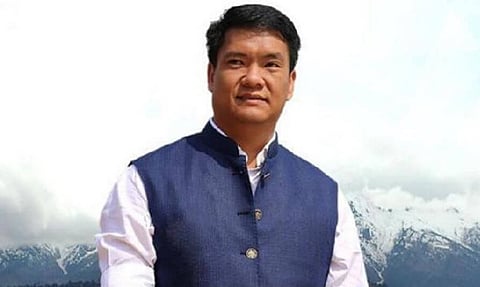
- Home
- Live Blog
- Breaking News
- Top Headlines
- Cities
- NE News
- Sentinel Media
- Sports
- Education
- Jobs

Arunachal Pradesh’s young and dynamic Chief Minister Pema Khandu has hit the headlines by way of taking a strong stand against the Union Government’s decision to grant Indian citizenship to several thousand Chakma and Hajong people living in the state. These people belonging to the Chakma and Hajong communities, had landed up in then North East Frontier Agency (NEFA) after they had fled erstwhile East Pakistan in the early 1960s following a large-scale crackdown on them by the Ayub Khan and Zulfiqar Ali Bhutto regime. The Chakmas and Hajongs, originally residents of the Chittagong Hill Tracts of the former East Pakistan, were forcibly ousted by the Pakistan government by way of choosing their land for construction of the Kaptai dam project and thus submerging their villages. While the Chakmas are Buddhists by faith, the Hajongs are Hindus. There were originally about 35,000 Chakmas and Hajongs, and it was at then Prime Minister Jawaharlal Nehru’s instance that they were packed off to the Tirap Division of then NEFA. According to the latest statistics presented in the Arunachal Pradesh State Assembly by the Chief Minister, there are close to 66,000 Chakmas and Hajongs in the state. Present-day Arunachal Pradesh in those days did not have an elected government, and thus the people of the state were totally unaware of the Union government’s decision to settle them in Tirap (now divided into four districts, of which the Chkamas and Hajongs are settled as refugees in Changlang and Namsai districts, apart from a few hundred families in Papum Pare district). While the Centre has been trying to provide them citizenship for close to three decades, it was a Supreme Court order of 2015 that had directed the Government to grant them citizenship. The genuine apprehension of the indigenous communities of Arunachal Pradesh is that while the Chakmas and Hajongs on being granted citizenship will reduce most of the indigenous tribes of the state into minorities, they would then also become strong political contenders of the local tribals. The situation is similar to that of Assam, where the illegal migrants from erstwhile East Pakistan and present-day Bangladesh belonging to a particular faith and language have already reversed the democratic equation in ten districts, and have, by way of getting enrolled as voters through various fraudulent means have already emerged as a strong political force. The ongoing protest – against the controversial Citizenship (Amendment) Act under which another major chunk of the illegal migrants who follow another faith but speak the same language as is spoken in Bangladesh are on the verge of getting Indian citizenship in Assam and thus threatening to reduce the indigenous communities of the state into a minority in their own state – has also further intensified the fears of the indigenous communities of Arunachal Pradesh vis-à-vis the Chakmas and Hajongs. Given this backdrop, it is very significant that Arunachal Pradesh Chief Minister Pema Khandu has decided to fight a legal battle against granting citizenship to the Chakmas and Hajongs. It may be recalled that Khandu’s government had on October 26, 2015 filed a review petition against the Supreme Court judgment of September 17, 2015. While the apex court had dismissed that review petition on November 19 that year, the Arunachal Pradesh government then filed a Special Leave Petition before the Supreme Court on September 14, 2016 and the hearing is awaited. Interestingly, while there has been apprehension that the Chakmas and Hajongs would now demand Indian citizenship under provisions of the Citizenship (Amendment) Act, Chief Minister Khandu has made it clear in the State Assembly on Wednesday that his government was ready to fight the legal battle “with all preparations.” What is also significant is that the Khandu government, despite being a one hundred per cent BJP government, has taken a strong stand in the interest of the indigenous communities of Arunachal Pradesh. That is being reflected in the fact that the Khandu’s BJP government has rejected all the 4,637 applications made so far by the Chakma and Hajong people seeking citizenship under the Supreme Court directive, and forwarded them to the Union Home Ministry.